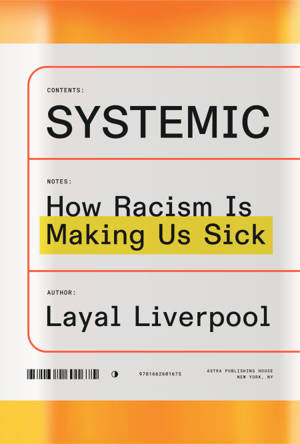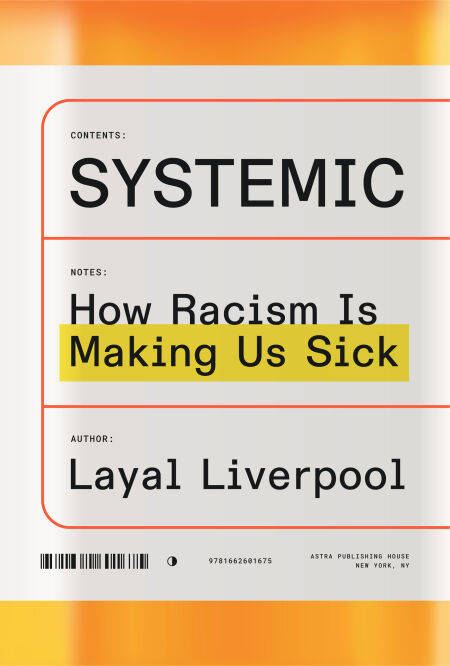
Je cadeautjes zeker op tijd in huis hebben voor de feestdagen? Kom langs in onze winkels en vind het perfecte geschenk!
- Afhalen na 1 uur in een winkel met voorraad
- Gratis thuislevering in België vanaf € 30
- Ruim aanbod met 7 miljoen producten
Je cadeautjes zeker op tijd in huis hebben voor de feestdagen? Kom langs in onze winkels en vind het perfecte geschenk!
- Afhalen na 1 uur in een winkel met voorraad
- Gratis thuislevering in België vanaf € 30
- Ruim aanbod met 7 miljoen producten
Zoeken
€ 19,71
+ 19 punten
Uitvoering
Omschrijving
In the spirit of Medical Apartheid and Killing the Black Body; A science-based, data-driven, and global exploration of racial disparities in health care access by virologist, immunologist, and science journalist Layal Liverpool.
Layal Liverpool spent years as a teen bouncing from doctor to doctor, each one failing to diagnose her dermatological complaint. Just when she’d grown used to the idea that she had an extremely rare and untreatable skin condition, one dermatologist, after a quick exam, told her that she had a classic (and common) case of eczema and explained that it often appears differently on darker skin. Her experience stuck with her, making her wonder whether other medical conditions might be going undiagnosed in darker-skinned people and whether racism could, in fact, make people sick.
The pandemic taught us that diseases like Covid disproportionately affect people of color. Here, Liverpool goes a step further to show that this disparity exists for all types of illness and that it is caused by racism. In Systemic, Liverpool shares her journey to show how racism, woven into our societies, as well as into the structures of medicine and science, is harmful to our health. Refuting the false belief that there are biological differences between races, Liverpool goes on to show that racism-related stress and trauma can however, lead to biological changes that make people of color more vulnerable to illness, debunking the myth of illness as the great equalizer.
From the problem of racial bias in medicine where the default human subject is white, to the dangerous health consequences of systemic racism, from the physical and psychological effects of daily microaggressions to intergenerational trauma and data gaps, Liverpool reveals the fatal stereotypes that keep people of color undiagnosed, untreated, and unsafe, and tells us what we can do about it.
Layal Liverpool spent years as a teen bouncing from doctor to doctor, each one failing to diagnose her dermatological complaint. Just when she’d grown used to the idea that she had an extremely rare and untreatable skin condition, one dermatologist, after a quick exam, told her that she had a classic (and common) case of eczema and explained that it often appears differently on darker skin. Her experience stuck with her, making her wonder whether other medical conditions might be going undiagnosed in darker-skinned people and whether racism could, in fact, make people sick.
The pandemic taught us that diseases like Covid disproportionately affect people of color. Here, Liverpool goes a step further to show that this disparity exists for all types of illness and that it is caused by racism. In Systemic, Liverpool shares her journey to show how racism, woven into our societies, as well as into the structures of medicine and science, is harmful to our health. Refuting the false belief that there are biological differences between races, Liverpool goes on to show that racism-related stress and trauma can however, lead to biological changes that make people of color more vulnerable to illness, debunking the myth of illness as the great equalizer.
From the problem of racial bias in medicine where the default human subject is white, to the dangerous health consequences of systemic racism, from the physical and psychological effects of daily microaggressions to intergenerational trauma and data gaps, Liverpool reveals the fatal stereotypes that keep people of color undiagnosed, untreated, and unsafe, and tells us what we can do about it.
Specificaties
Betrokkenen
- Auteur(s):
- Uitgeverij:
Inhoud
- Aantal bladzijden:
- 320
- Taal:
- Engels
Eigenschappen
- Productcode (EAN):
- 9781662601682
- Verschijningsdatum:
- 17/06/2024
- Uitvoering:
- E-book
- Beveiligd met:
- Adobe DRM
- Formaat:
- ePub

Alleen bij Standaard Boekhandel
+ 19 punten op je klantenkaart van Standaard Boekhandel
Beoordelingen
We publiceren alleen reviews die voldoen aan de voorwaarden voor reviews. Bekijk onze voorwaarden voor reviews.









